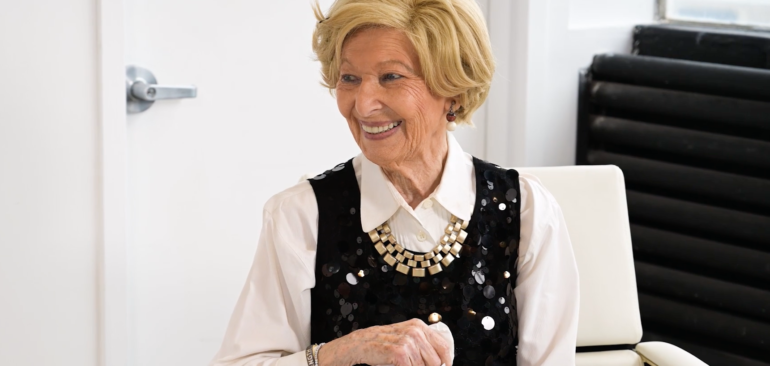
This 93-Year-Old Holocaust Survivor Will Inspire You With Her Faith
Dolly Rabinovich survived Auschwitz and the Death March, but lost both of her parents and several siblings in the Holocaust. After the war, she moved to the States, got married and raised a Torah observant family. Her advice to our generation is simple. “Love your mother and your father, your sisters and brothers. Have faith in Hashem. Do good deeds.” After all that she has suffered, her positive perspective is an inspiration to all.
Rabinovich was born in Berehovo, Czechoslovakia to an upper middle class Orthodox Jewish family. Her father, Solomon Spitz, had a strong business selling flour and wine, and the shul that he helped found still stands to this day. “My family visited there, saw its neglected conditions, but [it was still] intact.” The family often hosted visiting Rabbis such as the Satmar and Munkach Rebbes. But shortly after the Nazis came to her town, “my happy childhood life, and the life of the Jews in our town and elsewhere changed dramatically for the worse.” The Spitzes’ businesses were confiscated alongside their property, their hard-earned merchandise was appropriated for use by the Nazi army.
In March 1944, the S.S. ordered the town’s Jews to be taken to a working camp. “[A] feeling of panic, fear [and] uncertainty befell us. We had to leave all of our holy sacred books, silverware, china and furniture.” Mrs. Spitz’s foresight allowed them to quickly sew their jewelry into their clothing, to barter with it for lifesaving purposes. They were taken to an old brick factory. “The condition of the ghetto was sub-human…we began to realize to what the Nazis had reduced these upright, law-abiding businessmen, working people, doctors, lawyers [and more], simply because of our Jewish faith.” Rabinovich made the most of it by volunteering to assist the nurses, keep the children occupied and help cook. “Little did we know that the worst was yet to come.”
A few months later, they were all in cattle cars on their way to Auschwitz and Birkenau. The S.S. told the Jews to leave all their possessions on the train. Mr. Spitz would not let go of his tallis and tefillin bag. “The S.S. snatched it from him and threw it to the floor. When my father begged [the soldier] to keep only this one religious item, the S.S. answered, ‘Where you are going, you will not need it.'”
While Rabinovich’s parents, sisters, brothers and their children were selected for the gas chamber, she was picked by Dr. Mengele to be given work, as the dehumanized number A6889. “Early in the morning, we were lined up for headcount. I was quietly saying ‘Modeh Ani.’ An S.S. officer saw my lips moving. He yelled at me ‘What are you mumbling?’ [I hesitated, but] the girl next to me in line said ‘She is only reciting a poem.’ The girl saved me from a brutal beating or worse.”
Rabinovich’s job was to go through the belongings of innocent Jews like her, who had been forced to abandon their prized possessions, including jewelry sewn into coats, which made her mother’s death all-the-more painful. “I could write volumes of books [on] grief, and disaster of the inhuman conditions we suffered during the Holocaust, a deliberate genocide committed by the Nazis.” She is astounded by the people in the world who don’t believe that this ever happened. “Let the Holocaust deniers look into my eyes and talk to me as a living survivor. I’ll tell them the true facts. If their own grandparents, parents, husbands, wives, children and babies were murdered, gassed, burned in crematoriums or shot and thrown into mass graves never to return to them, would they [still] be deniers?”
In January of 1945, Rabinovich was forced to walk the Death March from Auschwitz alongside thousands of other Jews. Going all day and night without food, water, rest or proper clothing or footwear was only part of the terror. “Any of us who sat down on that cold, wet road was shot dead by the S.S. guards.” She was horrified as she had to walk alongside all the bodies of those who could not make the march. “I was tired, frozen and wanted to rest, but my [sister knew what would happen if I did] and held me up and pulled me for the rest of the march.” Those who arrived at the other camp of Ravensbruck “were half dead.” Rabinovich collapsed in a courtyard and when she awoke, there were dead bodies all around her. “I cannot describe the sight of what I saw or how I felt. It was above and beyond [any] description of despair.”
After being transferred to a third camp at Neustat, Rabinovich was starving and desperately looked for food. She was beaten for her efforts. Soon after, the war ended and her camp was liberated. She and her sister looked for surviving family and had heard that one brother survived and was looking for them. They searched across Poland, Czechoslovakia, Hungary and Germany. When they arrived back at their old home, five non-Jewish families were living there and were not happy to see them return. The Spitz sisters left in a hurry, having heard stories of Jews being killed when approaching the homes that had once been theirs.
Rabinovich is just grateful to have the family she has left. “What gives me strength now is the remaining family, to see that they are having children, growing up and getting married…and that I could see my brothers and sisters growing old, and that they are still around. They are still here to enjoy their family, their children and their good deeds.” Rabinovich’s own good deeds can give us strength in turn. “I hope that with God’s help, we will continue in good health and in loving Him.”
If you found this content meaningful and want to help further our mission through our Keter, Makom, and Tikun branches, please consider becoming a Change Maker today.







